- Home
- Jason Pinter
The Guilty hp-2 Page 4
The Guilty hp-2 Read online
Page 4
His detractors (yes, there were some) would eat it for breakfast. And every one of them would fork over their fifty cents to read it.
Over the past week, Paulina had interviewed two women who claimed to have slept with Loverne, both within the past year. One dalliance occurred in a limousine after a stump speech, the other in an airplane flying to Dubai. Taking
Loverne down would sell papers. Getting in another dig at someone close to Henry Parker was just icing on the cake.
There was a knock on her door.
"Come in," she said. In walked Terrence Bynes, the
Dispatch' s Metro editor. Paulina's direct boss. The fact that he would lick between the subway railings if Paulina asked him to was implicit in their relationship.
Bynes was wearing suit pants with cuffs an inch too long, and a blue work shirt that looked like it had been fermented with starch. His eyeglasses were too big, not to mention unnecessary, considering Paulina knew his last eye exam produced 20/19 vision. And she'd be willing to bet there was a rolled sock (or two) down his trousers as well.
"I assume you read the Gazette this morning," Bynes said.
"Fucking online edition," Paulina said, taking another sip, feeling that delicious warm tingle. "Read only by cheapos and kids without the attention span to click the 'Next Page' button.
Their print edition didn't have anything we didn't, that's all we should be concerned about."
"Tell that to Ted Allen," Bynes continued. "The man is pissed.
He thinks we got scooped, and he's looking to point the finger."
"We did get scooped," Paulina said. "But that's like saying we got stabbed by a toothpick at the start of a knife fight. What
Henry Parker wrote this morning won't be a blip on the radar tomorrow after Perez's press conference. So tell him if that finger goes anywhere near me I'm cutting it off."
Bynes smirked. "Why don't you tell him that?"
"Well, it's your job, but I'd be happy to. I'll e-mail him right now." She pulled out her keyboard and began typing.
Bynes placed his hand over the keys.
"That was a hypothetical question," he said.
She stopped typing. "Don't ever ask me a hypothetical question again, or I'll hypothetically strangle you with your shoelace. I call every bluff I see. Remember that."
Bynes swallowed, flicked his eyes down to his wingtips.
"So what do I tell Ted Allen? He's pissed this Parker kid got to the cops before we could."
Paulina leaned back in her chair. She closed her eyes. This
Parker kid. This Parker kid.
Her eyelids flew open.
"This Parker kid is a good reporter. Give me pages four through seven tomorrow for coverage of the murder."
"That's a lot of copy. Are you sure you'll have enough to fill that space?"
"Don't ask me that again. I could give a rat's ass what you do with pages eight, nine and sixty-nine. Oh, and get Tamara
Finnerman to do a write-up of David Loverne's speech at the
Alzheimer's event last night. When my story runs, I don't want people thinking we've had it in for him. Tell her to use prose so syrupy and purple I'll be able to see the Crayola logo.
Tell Allen that between these two stories, the Gazette will be limping within weeks."
Bynes laughed, then wiped a loose dribble of saliva from his mouth.
"I'm not going to tell him that. What, you think covering a story we've already been scooped on will suddenly have
Wallace Langston quaking in his Doc Martens?"
Paulina smiled at him, crossed her legs.
"Every war begins with an opening volley. Parker's scoop this morning was the Gazette' s opening volley. I'm not simply returning fire, I'm coming back with a Howitzer up their ass.
You know my ex-husband was a state prosecutor. One thing
I learned from him, other than that men are as useful as dirty bathwater, is that nobody remembers how you won, they remember if you won. We simply take what Parker has, know what he's going to know, and make it our own. Henry's a great reporter, but after last year he's nervous, twitchy, and doesn't want to rattle the cage any more than he already has. I have someone who'll shadow him closer than his beard stubble, and I'll be waiting to lay down the copy."
Bynes smiled. "I thought you said Finnerman was the one who wrote purple prose."
"Trust me," Paulina said. "It'll look better on paper."
7
I was walking toward city hall alongside Jack O'Donnell, nearly having to sprint to keep up. And his legs had an extra thirty years of mileage. I dialed Amanda, figured I'd say hi before radio silence. She picked up on the second ring. "Hey, hon, can't talk for long, just wanted to say hi. I'm heading to the press conference with Jack. Think I can smell the mayor's cologne a mile away," I said into the cell phone.
"Hey, babe. No problem," she said. "I'm about to go into the library and I think they've starting arming the cell phone police with automatic weapons."
"Good thing you finally learned how to use the vibrate button." Jack elbowed me. Amanda, I mouthed. He raised his eyebrows. Girlfriend. He opened his mouth to say ah. Then he ran his thumb across his throat. Cut it off. "Anyway, I'd better turn this off. Jack is giving me dirty looks. I'll call you as soon as this circus is over."
"Is it a three-ring circus, or does Athena Paradis warrant four?"
"You know, I think they might green-light the ever-elusive five-star circus. Just for Athena."
"The news ran video of Costas Paradis getting off his private jet this morning. I've never much sympathized with billionaires, but you have to feel for the guy."
I said nothing. Didn't have to.
"Give Jack my best. Knock the story out of the park, Henry."
"Will do," I said. "Stay quiet." I hung up. Jack was holding back a thin smile. "What?"
He allowed a small chuckle. "Like two sweet jaybirds, you two," he said. "Hope you don't mind my taking amusement in the love rituals of the young and naive."
I eyed Jack's hand, barren of any rings or jewelry other than a swank Omega wristwatch. I knew he'd worn a ring, years ago. He never showed any desire to discuss it.
I took my press pass out of my pocket and looped the lanyard over my head. Jack did the same. We rounded the corner and immediately became two small fish in the biggest school I'd ever seen. There must have been five hundred members of the press corps standing outside of city hall.
Dozens of cameras, many of them live, along with Brylcreemed reporters and onlookers peeking out of open office windows for blocks in every direction. Millions of people would be watching this conference, whether live or on the evening news. Which made our jobs near impossible. How do you find a shadowy corner when there are hundreds and thousands of eyes scanning every inch?
We ducked under a rope and tried to push our way to the front.
"Easier to dig to China," Jack said. "Screw this. I don't need to be close to hear Perez."
"He'll have the text up on his MySpace page within an hour anyway."
"Perez has a MySpace page?"
"Facebook, too. Wants to hit the young voters."
"Do young voters like him?" Jack asked.
"I wouldn't vote for him," I replied. "A little too much selfpromotion for my tastes."
Jack pulled a pair of folding binoculars out of his pocket.
He stared through them, peered along the dais and around the surrounding area. When he was done he passed them to me.
I took in the scene. The marble steps leading to city hall were polished a gleaming white. The podium was empty, waiting for Mayor Perez and, I assumed, Costas Paradis.
Three uniformed police officers stood on either side of the podium. They stood straight, arms at their sides, guns visible.
I swung the binoculars from right to left. When I saw who was standing directly to the left of the podium, I nearly dropped the binoculars.
"I saw him, too," Jack said. "He's not here for you. Be a pr
ofessional."
"Professional," I said, my mouth dry. "Right."
Standing to the left of the podium was Detective Lieutenant Joseph Mauser. One year ago, Detective Joe Mauser had chased me halfway across the country, shot me in the leg, and barely escaped with his life after taking three bullets in the chest.
I had followed Mauser's recovery over the months. Visited his guarded hospital room and was turned away by the very cops who'd wanted me dead before they found out the truth.
After two months in the hospital-fully recovered, minus one spleen, two ribs and twenty pounds-Joe Mauser transferred from the FBI to the NYPD. He attributed the transfer as a tribute to his fallen brother-in-law and in-arms, John
Fredrickson. The man whose death I was responsible for, indirectly or not. Mauser wanted to be closer to his sister, Linda,
John's widow. In various interviews, Mauser insinuated that he held no ill will toward me. That given the circumstances he would have defended his life and honor, as well. But a wound is a wound, no matter how it's caused, and the simple fact was his brother-in-law would still be alive if not for me.
Mauser had sold the book and film rights to his story for a reputed seven figures. He said the money wasn't for him, but would feed his sister's family, educate her fatherless children. If not for Mauser, my life wouldn't have been saved by a beautiful stranger. The same woman who now shares my bed. I guess we could call it even.
Mauser looked good, healthy and even a little tan. He looked like the kind of man who was proud to serve his city.
And I was glad to finally be on his side.
I could barely hear over the noise as reporters chirped into cell phones, cameras ran their feeds. Suddenly a hush came over the crowd and I saw Mayor Dennis Perez stride to the podium through the massive columns bracketing city hall.
Walking alongside Mayor Perez was Costas Paradis. The normally confident man looked pale, tired. But looking through the binoculars, I could see the anger that burned for his murdered daughter.
The mayor wore a striped gray suit and walked with a purpose. His mustache was neatly trimmed as always, but his eyes were bloodshot. He probably hadn't slept since Athena died. And Costas wasn't the kind of man to mourn. He was the kind of man whose grief turned to anger, whose anger turned to rage, and whose rage could scorch the earth. I just stood and hoped they found the killer before more families experienced that grief.
The crowd grew quiet. Though the majority in attendance were paid to speak, discuss and bloviate as loud as humanly possible, they also knew that if they missed a single word they could miss a scoop, fall behind, give people a reason to pick up a paper or watch a newscast other than theirs.
I thought about Wallace's sign by the elevators. Then I looked at the sea of microphones and suits. Just like a marathon, a giant mass beginning as one. But that wouldn't last. The good ones would break away.
Mayor Perez stepped to the podium. Costas Paradis stood next to Perez, and I could sense the mayor's discomfort, like a child forced to admit wrongdoing in front of an angry parent.
"Ladies and gentlemen," he began. His eyes traveled from right to left. Making sure he made eye contact with every camera he could. Give each station their half second of exclusive content. "At approximately one thirty-seven this morning, Athena Paradis was shot and killed as she was leaving a nightclub. This is a shocking and heinous crime, perpetrated by an individual whose depravity knows no bounds.
At this very moment we have unleashed the very best men and women upon the crime scene to establish just who is responsible for Ms. Paradis's death, as well as their motives in doing so. No stone will remain unturned, not a second will go by where Ms. Paradis's murderer will have a chance to breathe."
Jack was scribbling in a notepad. I was watching their eyes. Mayor Perez. Costas Paradis. Joe Mauser. There was worry in them. Right then I knew they had nothing.
The mayor continued.
"The true test of a city is challenge. The test of a family is grief. In this investigation, we will grieve for the memory of
Athena Paradis, but rise to the challenge of bringing her killer to justice."
"Second book," Jack said, pen hanging from his mouth.
"What?"
"That line. From Perez's second book. Just made himself another ten K in royalties right there."
I shook my head as Perez continued. "What we do know at this time is that the shooter is most likely a lone assailant, the murder weapon a high-powered rifle which was discharged from the roof of a building several blocks away from the club where Ms. Paradis was performing that evening. We have taken casts of footprints discovered at that rooftop, and are matching them with known offenders as we speak."
Bullshit, I thought. Officer Lemansky told me the rooftop was covered in gravel. Unless they developed some way to detect footprints in rocks, they're throwing us a hollow bone.
He continued. "We have many unfortunate witnesses to the crime itself, but as of yet nobody has come forward who has been able to positively identify the assailant."
At this point Costas Paradis moved a half inch closer. His eyes seemed to be burning a hole through Mayor Perez's neck. The mayor swallowed. He held his hand up, index finger extended.
"Let me assure you that the NYPD is using every available resource to find this heartless and soulless coward, and the NYPD will not rest until the assailant has been brought to justice."
Perez's eyes became sorrowful and he lowered his head.
"At this time I would like to express my sincerest condolences to the Paradis family. I have known Athena's devoted father, Costas, for many years, and suffice it to say his daughter's death is not only felt by the Paradis family, but is felt by his family and friends both in this city and around the world.
Justice will be served."
Hotel Paradis, Paradis Park, Paradis Skating Rink, I thought. Not only was there a murderer loose, but there were millions, perhaps billions of dollars at stake. Maybe Perez should quote a few more lines from his book. Catching
Athena's killer was not only a moral and legal priority, but one the mayor needed to help pay for those campaign reelection ads with spiffy production values.
Perez went on for another few minutes. He spoke a great deal but said very little.
"I've seen mimes more eloquent," Jack said. He leaned in closer. "Listen, I've got a contact in the medical examiner's office. As soon as this little soiree breaks up I'll have him on the phone. I want you to talk to him before we file any copy."
"What do you want me to do?"
"He owes me a solid. After you talk to him, I want you to go back and canvas the area around the Kitten Club. People don't like talking to cops. Answering questions makes them feel like they're being accused of something. Too many freaking Law amp; Order spin-offs. Anyway, tell them who you are. A newsman, their voice, the voice of the people. You make 'em believe it, they'll let you hold their newborn."
"Got it."
At that moment, Mayor Perez said, "And now I'd like to turn the podium over to Police Commissioner Alan Bradley, who will answer further questions."
"Might be worth leaving now," I said. "Get a head start."
"Not yet," Jack said. "Leaving early is how you miss the big stuff."
Commissioner Bradley, a stocky bald man in his early fifties, shook hands with the mayor and Costas Paradis. He stepped to the podium with a look of gravity and sincerity.
Then I noticed something strange.
Joe Mauser was flinching. He brought his hand up to his eyes, as if shielding the sun. I took the binoculars, followed his line of sight. He was looking at a building across the way.
Then I saw what he saw-a faint glimmer of light off of… something- and then all hell broke loose.
Mauser dove to his left a millisecond before the air was shattered by a deafening crack. I saw a fountain of red explode by the podium, and suddenly hundreds of people were screaming and running and cursing and fleeing.
I heard someone yell, "He's been shot!" EMS workers sprinted up the stairs. I watched in slow motion detachment, arms and legs pummeling me as they flew past. A man and a woman in white knelt down beside a fallen person atop the stairs. Police had their guns drawn and were yelling into walkie-talkies. Their eyes were all looking up, guns drawn.
At the rooftops. Where the gunshot had come from.
I looked through the binoculars to get a better view of the carnage.
I could see a group of cops ushering the mayor and Costas
Paradis inside city hall. An ambulance was trying to get through the pandemonium but was having no luck. The cops were shaking, ready to fire at an instant's notice.
I saw the EMS crews working as fast as they could on the downed officer, but through the binoculars I could see one of them shake her head. Watching fingers of blood drip down the steps, I knew what she was thinking. This one can't be saved.
As they placed the cop on the stretcher, I increased the magnification. I could just make out the face.
My breath left me. I dropped to my knees. Panting. Felt
Jack's hand on my shoulder. Felt the world swimming away.
Saw the face again. Saw his brother in-law's face. Both men lying in a pool of their own blood.
The downed cop was Detective Lieutenant Joe Mauser.
She was lying on her back. Propped up against three pillows.
One more across her chest. One more by her right arm. She felt warm, safe, comfortable. Henry made fun of her for this. Said she was building a fort every night. Yet when the lights went out, after Amanda had burrowed into her pillow castle, she would push the pillows aside and gently lay her head on his chest.
She would listen to Henry breathe. Listen to his heart beat.
She knew when he was thinking about a story-his heart beat a little faster. She knew if the day had been long and challenging, or fast and invigorating. All this from his heartbeat.
She would glide her finger down his chest, tickling his side.
She knew he was sensitive, but he never told her to stop.
Sometimes she would run her finger along the scar where the bullet had come so close to ending his life. She knew that in some way she was responsible for that scar. For some reason, despite the pain it had caused Henry, she was glad it was there.

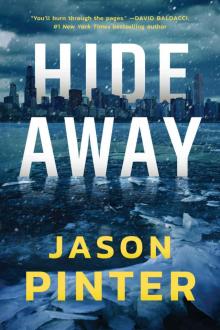 Hide Away (A Rachel Marin Thriller)
Hide Away (A Rachel Marin Thriller)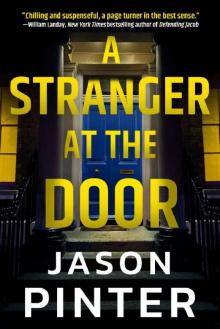 A Stranger at the Door (A Rachel Marin Thriller)
A Stranger at the Door (A Rachel Marin Thriller)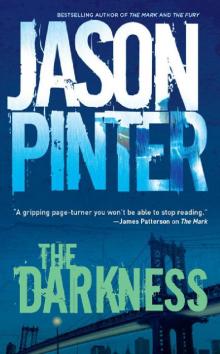 The Darkness hp-5
The Darkness hp-5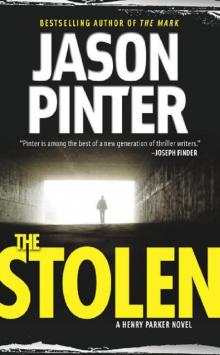 The Stolen hp-3
The Stolen hp-3 The Guilty hp-2
The Guilty hp-2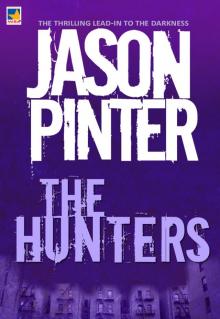 The Hunters
The Hunters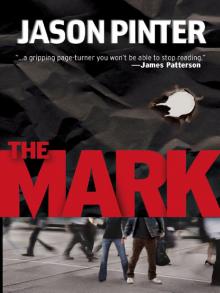 The Mark hp-1
The Mark hp-1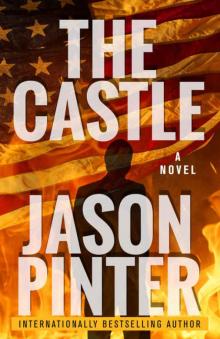 The Castle: A Ripped-From-The-Headlines Thriller
The Castle: A Ripped-From-The-Headlines Thriller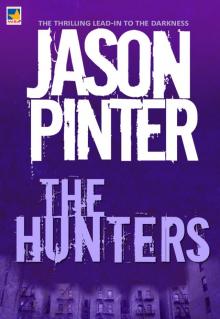 The Hunters (henry parker)
The Hunters (henry parker)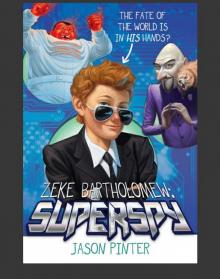 Zeke Bartholomew
Zeke Bartholomew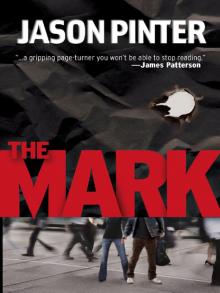 The Mark
The Mark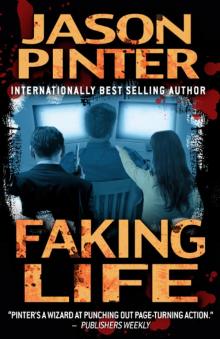 Faking Life
Faking Life![[Henry Parker 01.0] The Mark Read online](http://i1.bookreadfree.com/i2/04/08/henry_parker_01_0_the_mark_preview.jpg) [Henry Parker 01.0] The Mark
[Henry Parker 01.0] The Mark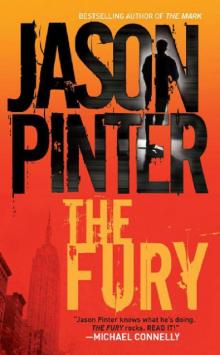 The Fury hp-4
The Fury hp-4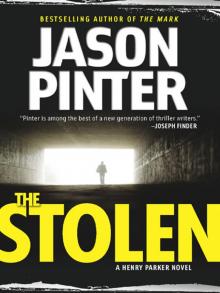 The Stolen
The Stolen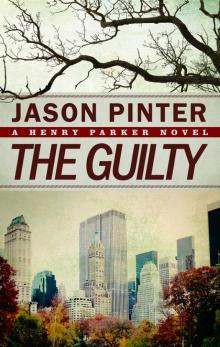 The Guilty
The Guilty